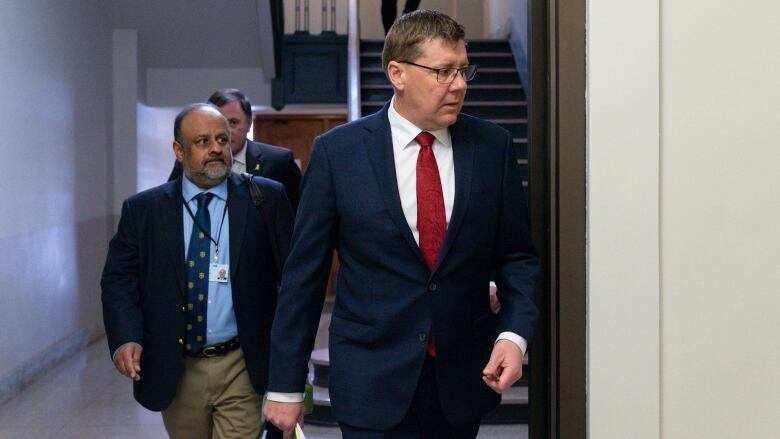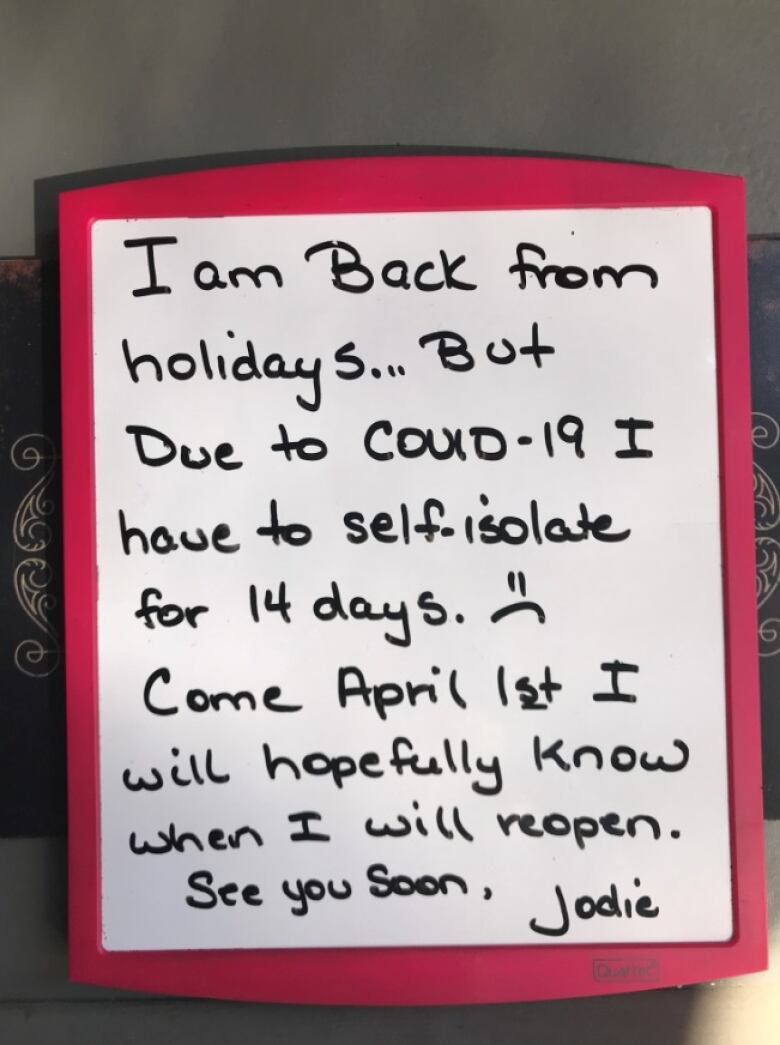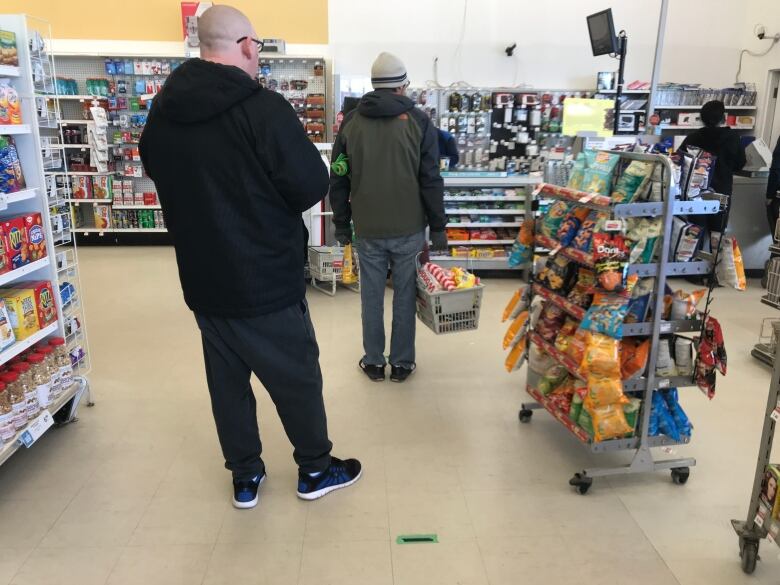COVID-19 in Sask: 14 new cases reported, bringing total to 66
'We are at a critical point now': Province's top doctor

- The province reported 14 new cases Monday. That brings the total to 66.
- Two cases are between the ages of five and 19, with all others being adults.
- Saskatoon cases jump to 30 from 21.
- Little is known about the two previously-disclosedCOVID-19 cases who are in hospital, besides their having pre-existing illnesses.
- The top doctor's advice on physical distancing:"I wouldn't go into an elevator with five people."
- Mayor Michael Fougere says he's 'disappointed' the province is vetoing Regina-specific COVID-19 measures.
- Here are some tips on what you should (and should not do) while in self-isolation.
Saskatchewan reported 14 new cases of COVID-19 Monday, bringing the province's total number of cases to 66.
Notably, two of the cases are in people between the ages of five and 19.
In Saskatoon, the cases jumped to 30 from 21 in one day.
"Thank you to everyone who is staying home," Premier Scott Moe said during the dailyafternoon news conference. "It may notfeel like you're doing your part, but I can assure you, you are."
Asked about the potential for shutting Saskatchewan's borders, Moe replied, "We see some other provinces starting to look at this. I'm not sure how this would get policed."
Few details on hospital patients
Health officials did not have answers when asked whether any COVID-19 patients are in intensive care and said they would not even answer that question if they did, citing concerns about patient privacy.
The last information offered, on Saturday, was that two cases were in hospital due to pre-existing illnesses.
Officials did not answer questions about whether the conditions of those patients has worsened.
Unlike previous updates from the province, Monday's update did not specify how many of Saskatchewan's COVID-19 cases are well enough to self-isolate at home.
'We are at a critical point'
Dr. Saqib Shahab, Saskatchewan's chief medical health officer, said he's encouraged by the physical distancing he has seen in the province in recent days. If sustained, the province has a chance at flattening the curve of the virus, he said.
"We are at a critical point now because most of the cases are still either travel or related to [past] large events," Shahab said. "Large events now are no longer happening in Saskatchewan."
Shahab was asked why the province doesn't officially institute arule dictating there must be five or fewer people in anygroup.
He said events like Monday'snewsconference, with 10 to 12 people, are okay as long as people maintain a physical distance of two metres from each other.
But he added, "I wouldn't go into an elevator with five people."
Police chief says most people are complying
Late last week, Moe threatened recent international travellers who failed to self-isolate with arrest and a $2,000 fine. He also encouraged people to report non-compliant self-isolators to the police.
On Monday, Saskatoon Police Chief Troy Cooper sought to clarify what the public should do when they believe a person is breaching the provincial self-isolation order.
"I'd just like to let everybody know that if they find somebody or some organization that's not complying with the order that they can call our non-emergency number and our staff will attend," Cooper told city councillors.
"We do our best, I think, to promote voluntary compliance with the order and I'd like to mention of course that the vast majority of citizens voluntarily comply But in some situations people are not informed properly and or they're not understanding what the actual requirements are."
He said police can provide that information and "gain compliance" as required.
The 'no-contact' phase
Residents over the weekend could see several signs of how quickly things have changed: flashing "load at rear" displays on the front of city buses; stop signs on storefront windows asking people to check or phone in before they enterthe building; notices of businesses closed; sticks of tape to demarcate the recommended distance between people lining up at checkout lines.
But on Monday, the province-wide response to the COVID-19 coronavirus will kick into a higher gear as even more strict measures take effect for a wide swath of businesses.
Any place that serves food will have to shut its doors to sit-down customers and offer pick-up or takeout only, albeit under the condition that staff and customers maintain a two-metre distance. It's what Moe flagged as "Phase 2" of the province's growing response to the virus.
Already by the weekend, businesses like Pizza 73 were touting "contactless delivery" to mollify customers potentially concerned about exposure to the virus.

A long list of business that rely on close person-to-person contact tattoo parlours, salons, acupuncturists, the list goes on don't have that option; they have to shut down completely.
At least one barbershop in Saskatoon had already taken that step anyway, according to the marker board on its front door.

Though cities like Regina and Saskatoon had already shut down all of their leisure facilities, now all such places of civic congregation, such as fitness centers, casinos, bingo halls, arenas, curling rinks, swimming pools, galleries, theatres andmuseums, have to close their doors.
"We have no idea how long that will last.We are planning for a minimum of a month closure," said Tom Hutchinson, the president of the Magic Lantern theatre chain, which owns The Roxy independent venue.
Bars, nightclubs and lounges were already ordered to shutter before the weekend.
"Take out of alcohol or food products"is allowed, provided the same two-metre distance rule between servers and patrons is applied.
Dentist offices are limited to "non-elective procedures," according to the government edict released Friday.
Grocery stores, pharmacies and gas stations are exempt from the province's restrictions.

Daycares limited to 8 children per room
Beginning Monday, the Saskatchewan government is reopening someschool daycares to use as spaces to care for the children of health care workers and other professionals desperately needed to respond to the viral outbreak.
But daycares, too, are under new rules: only eight children per room.
Regina goes rogue
How many people could gather together became the source of some confusion over the weekend after the City of Regina passed its own rules, including an even stricter five-people-max rule for gatherings.
The province, by contrast, is still mandating a up-to-25-people-in-one-roomrule (though Shahab, has personally recommended that people stay home and restrict their social bubble to a very small fraction of that).
On Sunday, Moe's governmentannounced it would move to effectively cancel Regina's rogue measures, ensuring a consistent set of rules apply across the province.
Regina Mayor Michael Fougere addressed the media Monday at 11 a.m. CST., saying he was disappointed with the veto.
Lab testing for COVID-19 prioritized
The Saskatchewan Health Authority announced Sunday that it would prioritize testing of people for COVID-19 by simultaneously limiting routine testing at all of its outpatient labs beginning on Monday.
Testing related to prenatal, cancer and transplant patients will continue.
Click here for a full list of the testing types that will also carry on.
As of Monday, health officials had tested 5,269people in the provincefor the virus.
The following graph shows the cumulative testing numbers in the province as of each date listed:
Most cases are in Regina and Saskatoon.
"These numbers follow the population density so there is nothing unusual in these numbers," Shahab said Saturday.
Regardless, he said everyone in the province should follow the guidelines laid out to helpprevent the spread.
"It doesn't matter which community you live in."

An update on the case numbers is expected Monday afternoon at 2:30 p.m. CST. Stream it live here.
Ahead of Monday's news conference, the province announced the launch of a business response team led by the Ministry of Trade and Export Development.
Through a new website, toll-free number (1-844-800-8688) and emailaddress (supportforbusiness@gov.sk.ca), the team is helping business owners find supports as they deal with the measures imposed because of COVID-19.
Testing without recent travel
Health officials have asked only people who have symptoms of COVID-19 and a history of recent travel to request testing.
On Saturday, however, Shahab said some people who don't require hospital care and haven't recently travelled, but who have severe symptoms like chills, a high fever and nausea, have undergone testing.
"In those situations there is clinical discretion to test anyone irrespective of travel because you have to test ... to advise treatment and of course to predict that, if symptoms worsen, you will require hospitalization.."
Health officials also confirmed they are testing all current hospital patients with respiratory issues.
The U of S is shutting down
Effective Tuesday afternoon, all University of Saskatchewan buildings will be closed.
The only people allowed in will be those designated essential to core operations.
And onWednesday students will be moved out Voyager Place residence buildings on campus.
"Students who are able to return home, will be asked to do so,"said George Foufas, director ofConsumer Services at the U of S, in a news release."All remaining students unable to return home that are currently living in these dorm-style rooms will be moved to alternate apartment-style units in other residence buildings."
Foufas said the apartment-style units have full kitchens where students can practice proper social distancing.
The release said all remainingremaining residence students havein-room kitchens, and Marquis Culinary Centre will also be closed.
There are currently no known cases of COVID-19 in USask residences.













_(720p).jpg)


 OFFICIAL HD MUSIC VIDEO.jpg)
.jpg)



























































































